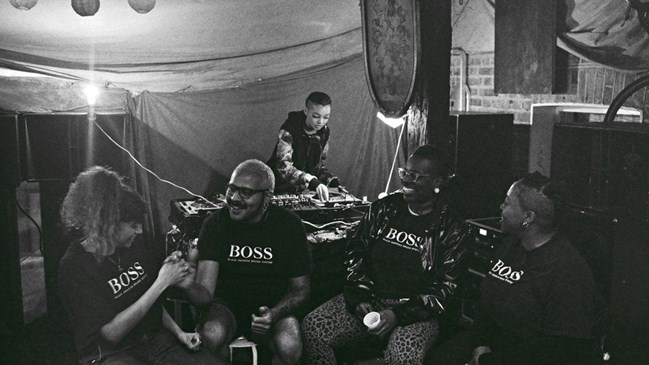
London -based collective B.O.S.S, calls out Tate for their exploitative practice, and are demanding the right to thrive in conditions that are nurturing and supportive.
Black Obsidian Sound System Collective (B.O.S.S.), one of the five artist collectives shortlisted for the Turner Prize announced this month, has responded to Tate - the award’s main sponsor - in an open letter.
The eighteen-member London-based collective, founded in 2018 to convene a QTIBPOC (queer, trans and intersex black and people of color) community centered around art, sound, and activism are demanding the “right to thrive in conditions that are nurturing and supportive” …
 Black Obsidian Sound System Collective
Black Obsidian Sound System Collective
“A People’s art is the Genesis of their freedom”
- Claudia Jones
Black obsidian is a smooth volcanic rock formed by the quick heating and cooling of lava. It is known as a stone of truth, of protection, of security, and for cultivating a feeling of stability from within. Black obsidian repels negative energy and discordant vibrations. It amplifies and transmits high frequencies and demonstrates the appearance of light within darkness.
Since the summer of 2018, Black Obsidian Sound System (B.O.S.S) organises with the intention of bringing together a community of queer, trans and nonbinary Black and people of colour involved in art, sound and radical activism. Following in the legacies of sound system culture, we want to learn, build and sustain a resource for our collective struggles. The system, based in London, is available to use or rent by community groups and others with the purpose of amplifying and connecting us.
We draw on the sound system as an archetype of black expression in order to present a more nuanced and complex picture of our individual and collective concerns. Somewhere in the space between history and myth we seek to choreograph a new way of being and existing in the world together. Whilst we are grateful for the recognition for our work as a collective, it is important for us to name some of the inconsistencies as we observe them.
What does it mean for a collective such as ours to receive such recognition in the art world at this time?
Although we believe collective organising is at the heart of transformation, it is evident that arts institutions, whilst enamoured by collective and social practices, are not properly equipped or resourced to deal with the realities that shape our lives and work. We see this in the lack of adequate financial remuneration for collectives in commissioning budgets and artist fees, and in the industry’s in-built reverence for individual inspiration over the diffusion, complexity and opacity of collaborative endeavour.
The urgency with which we have been asked to participate, perform and deliver demonstrates the extractive and exploitative practices in prize culture, and more widely across the industry – one where Black, brown, working class, disabled, queer bodies are desirable, quickly dispensable, but never sustainably cared for. We remember what Claudia taught us.
Over the last year, there have been strike actions at several art institutions, including the sponsor of the Turner Prize, Tate, protesting the redundancies staff have been forced to take. It is not lost on us that the collective action of workers coming together to save their jobs and livelihoods was not adequately recognised by Tate.
We understand that we are being instrumentalised in this moment. We ask ourselves: how can a BPOC queer collective of artists and cultural workers be nominated for the Turner Prize whilst Black women artists continue to be silenced? Cases like Jade Montserrat’s are not isolated in the art world. We amplify Industria’s Open Letter to Tate, which lists a number of demands that are yet to be met, and to which you can add your signature.
So whilst we orient ourselves towards a practice of abundance, it is crucial that we acknowledge the context from which our participation emerges. We demand the right to thrive in conditions that are nurturing and supportive.
“I hope that there comes a day when people like myself are able to enter without the complaint, without the requirement to speak on behalf of everyone else like us."
— Jade Montserrat, quoted in Chaminda Jayanetti, ‘The Tate 'Banned' a Black Artist After She Called Out an Art Dealer's Sexual Abuse’,

ArtDependence Magazine is an international magazine covering all spheres of contemporary art, as well as modern and classical art.
ArtDependence features the latest art news, highlighting interviews with today’s most influential artists, galleries, curators, collectors, fair directors and individuals at the axis of the arts.
The magazine also covers series of articles and reviews on critical art events, new publications and other foremost happenings in the art world.
If you would like to submit events or editorial content to ArtDependence Magazine, please feel free to reach the magazine via the contact page.